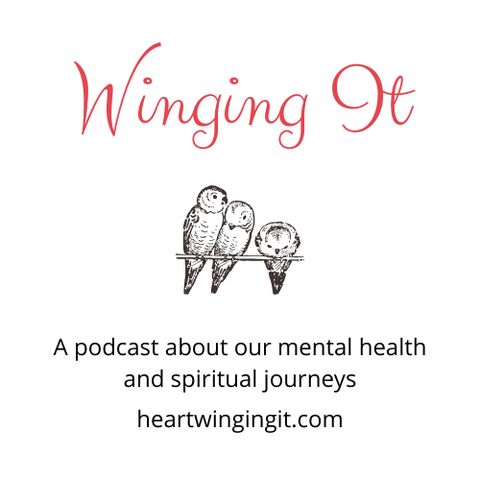Winging It Episode 12: Grief and It Is What It Is

Scarica e ascolta ovunque
Scarica i tuoi episodi preferiti e goditi l'ascolto, ovunque tu sia! Iscriviti o accedi ora per ascoltare offline.
Descrizione
The Stages of Grief are listed as Denial, Anger, Bargaining, Depression, Acceptance - and there is no clear cut path through them, as we often go back and forth or...
mostra di piùAt first, it feels like we've lost a freedom to make our own choices, but when we discuss it further, our choices have just changed. Heather chooses to continue to stay inside to avoid transmission, as well as making end-of-life decisions now just in case, but she wants the peace of mind in making her own choice if she were to get sick and end up in the hospital. Instead of protesting for the choice to go out, we need to be aware that it's fear of death and denial or anger at the changes, and look to compassion and acceptance and make plans instead of blame.
Amy discusses taking a hard look at the anger and where it surfaces for each of us during this time. Are there past triggers that need to be sorted out? The overall grief now is different from direct loss of a loved one, and we acknowledge that, but humans across the globe are processing these emotions together now. Are we feeling Angry at the world or ourselves? Are we dealing with Depression? Even those of us who have dealt with Depression and Anxiety for years, this is different.
We remind ourselves that the current mental load is still pretty heavy - there is still work to be done and we have to take care of the things in our daily lives that demand our attention. This "pause" in time is not just a "snow day", we still have to slog through the things that need to be taken care of, and be aware that we need to do things safely so we don't get hurt and end up in a hospital at this time anyway!
We look around and see what others are accomplishing during this time, and yes, sometimes we still feel like we're not doing enough or doing the same things as others. This is another reminder to *not* compare - we all have skills and offer different things to this world. We'd like to look toward community, communication, and cooperation instead of competition and conflict as we all move forward.
Instead of comparing ourselves to others and their level of accomplishments, we recognize we don't know what others are going through or how they process their emotions or their time in this situation. Telling ourselves we "should" do something does not help. Be able to say "It Is What It Is." right now, and accept this moment as it is. Someone else may be going through Bargaining or Denial or Anger but be producing good work. We only know our own moment and how we are dealing with it.
Heather discusses the loss of a family member a few months ago versus the grief of the current situation. And then looking at her own Depression days and determining if it's related to the pandemic or her own history. Amy reminds us that if we've dealt with Depression in the past, then our body is used to that response, creating neural pathways much like ruts in a dirt road. (We grew up in parts of Texas where dirt roads are normal driving.) She indicates the Yoga term "Samskara" where things go along where they are used to going. These cues in our body from past experiences can be because of past trauma, even if they don't make sense now. Our body tries to protect us, like "Fight or Flight" response, even if there is no immediate threat. Recognize your own self-talk and be aware of your own responses so you can be in the moment, even if it's scary.
Saying "It Is What It Is" is part of the acceptance. Heather mentions the fact that the current situation has aggravated her disordered eating patterns. She's dealing with her health issues and fear/anxiety around food in this time when shopping and food options are limited. Amy discusses her past traumas flaring up around money and anger and fear, even now in a healthier relationship. Both acknowledge that experiences with Depression may be helpful in noticing how they handle the situation now, as well as encouraging their friends and family members who are feeling Depressed to seek help.
Closing reminders - Communicate, ask for help if you need it. Be mindful and aware that it's not just you dealing with this. It Is What It Is. For right now. It will change.
If you do feel Depressed and need help, the National Suicide Prevention Lifeline is: 800-273-8255. Military and Mil-Spouses can access help through MilitaryOneSource.mil or 800-342-9647. Some communities and states have set up mental health support access specifically to discuss COVID-19 and the current situation. In Texas, that number is: 833-986-1919.
Informazioni
| Autore | Amy & Heather |
| Organizzazione | Amy & Heather |
| Sito | - |
| Tag |
Copyright 2024 - Spreaker Inc. an iHeartMedia Company

Commenti